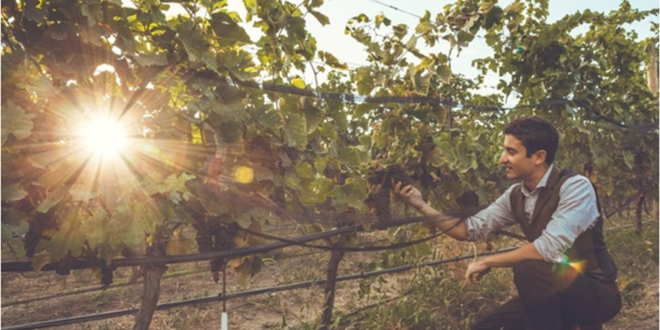The British Columbia wine industry is booming, contributing $2 billion annually to the province’s economy annually. We number more than 250 wineries now and our wines are now being exported around the world, and gaining attention from influential critics and buyers.
With all this forward growth, where new are we going next? It’s quite simple, really. We’re going back to our roots, looking back – way back, to the beginning of wine.
Wine has been made for thousands of years, before pesticides and chemicals were embraced and prior to heavy-handed manipulation in the winery were used. In BC, as globally, there is a growing movement to return to some of these simpler, more honest wines. Much like we’ve seen with foodstuffs, people are paying attention to what they’re putting in their bodies. Think about it: why make great effort to buy organic vegetables and free range chicken and GMO-free breads made from heirloom grains, only to serve it with a bottle of chemically enhanced, additive-heavy and highly manipulated bottle of wine?
Though few in number, the results have been mighty and now numerous local producers have embraced organic, biodynamic and natural winemaking techniques. Summerhill Winery was the first to fully embrace and promote organic wines since the Cipes family purchased the property in 1986. Their cellar was certified organic in 2007 and they have gone on to receive Demeter Biodynamic certification for their Kelowna home vineyard in 2012.
Okanagan Crush Pad is another producer who has made the commitment to these minimalist practices in a big way. Through their Haywire and Narrative wines they have embraced wild ferments, low-to-no additives and fermentation in historic vessels such as concrete. Naramata’s Lock & Worth Winery has been dedicated low intervention since they began, focusing on single vineyard, small production wines utilizing wild yeast, and eschewing fining or filtration for the purest expression of site. And Bella Wines is releasing Methode Ancestrale sparkling wines with zero additives, going so far as to hand bottle and tag.
Even some of our larger producers are making one or two cuvées of more natural wines. CedarCreek has made an amphora Cabernet Sauvignon naturally, left for eight months on the skins in special neutral unlined clay pots. Stag’s Hollow released a natural Viognier-Marsanne that spent two weeks on the skins before a year on the lees in older acacia barrels.
All are small lots that have yielded highly promising results – enough that all these wineries and many others will be devoting more resources and attention in the future, to looking back.
More than the dirt, what you need to know:
Sustainable
This is not a regulated term and it differs from place to place. Generally sustainable winemaking signals a closer connection to the land, farming and winemaking practices. Often chemicals are reduced or eliminated in the vineyard and winery, water and machinery use is monitored closely and every effort is made to produce wine in a clean manner.
Organic
Organic farmers use no fungicides or pesticides in the vineyard, relying on natural fertilizers and biological pest control.
Biodynamic
This holistic philosophy of farming can include tending vines according to the astronomical calendar and using herbs, minerals and manure for sprays and composts. Emphasis is placed on the integration of crops and livestock, recycling of nutrients, soil maintenance, and the health and well-being of the animals, the farmer, the farm, and the earth
Natural
A hot topic, the definition of natural wine is also debated. Generally it indicates wine made without any chemicals, and with minimum technological intervention in growing grapes and the winemaking process. The term is used to differentiate from organic wine and biodynamic wine due to the differences in cellar practices; in most places, organic and biodynamic winemaking allows for sulfites and other additives to be added throughout the process (sugar, yeast, acid, etc.) Some natural wine producers and organizations also mandate dry farming, hand picking, and an absence fining or filtration.
You can read more of the news on source
 Travelsmart
Travelsmart



